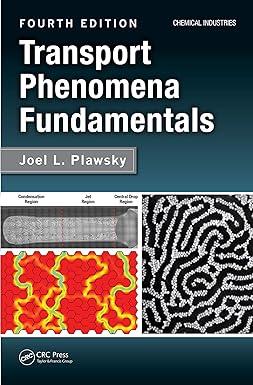An empirical correlation for diffusion coefficients was developed by Wilke and Chang [47]. For water as the
Question:
An empirical correlation for diffusion coefficients was developed by Wilke and Chang [47]. For water as the solvent this formula is:
\[D=\frac{5.06 \times 10^{-16} T}{\mu_{w} \bar{V}_{s}^{0.6}} \mathrm{~m}^{2} / \mathrm{s} \quad \text { Wilke-Change equation }\]
where \(T\) is the absolute temperature, \(\mu_{w}\) is the viscosity of water, and \(\overline{V_{s}}\) is the molar volume of the solute at its boiling point. Compare values calculated from problem 21 with those calculated here with the exception of hemoglobin.
Problem 21:
Compare experimental and calculated values of the diffusivity (at 298 K ) for the following compounds in water at infinite dilution: methanol, propane, oxygen, helium, and hemoglobin. Which version of the Stokes-Einstein relation comes closest; no-slip (sticking) or no stress (slipping)? How do these values compare with the free volume result?
Step by Step Answer:






